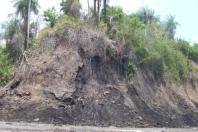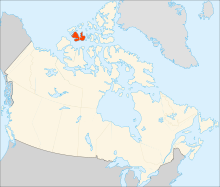Canada (Melville Island tar sands)
[if you are looking for information on tar sands in Alberta or Saskatchewan province in Canada, please go here ]
The plot:
Currently no plans for development in the public realm, however designs on Melville Islands tar sands would likely happen in a context of large energy corporations exploring and attempting to develop all manner of oil and gas in adjoining Arctic areas that are now becoming economically and physically attainable only as a result of climate change.
Details:
Unmeasured for in-place estimate, the large deposit of bituminous sands near Marie Bay currently has no proposals for development. However, Suncor Energy of Canada does have an exploration permit for gas estimated in the trillions of cubic feet in the adjacent islands (in the Sverdrup Basin).
The areas of the Arctic that include the Melville Island tar sands deposits also include multiple predicted large deposits of gas and other oil, according to previous geologic exploration. Suncor owns certain permits in the Sverdrup Basin while many companies have sought to have the Arctic opened to further exploration, as a step to ultimately developing the far north.
As climate change rapidly makes the Arctic ice sheets melt, Canada's pro-industry government sees this as a major boon for both Canadian resource development and even international muscle flexing. Control of the soon to perhaps be the ice-free Northern Passage alongside major new oil, gas and tar sands exploration and development likely figures near the top of Canadian government “adaptation” strategies for onsetting climate change.



